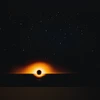Scientists have always suspected a link between what powers the black holes and the expansion of the universe. A new theory has just strengthened that long-held belief. The new study claims that dark energy may have some connection to black holes with the latter responsible for driving the never-stopping growth of the cosmos.
According to the theory, as more black holes were born in "little Big Bang reverse replays" in the universe, the strength of dark energy grew to dominance and continues to change to this day.
Dark energy has remained a mystery for scientists ever since it was discovered, and its nature and origin remain elusive. However, it is believed to be responsible for the acceleration experienced by the expanding universe today. It dominates our universe, constituting about 70 per cent of the cosmic matter/energy budget.
A team of researchers led by Professor Gregory Tarlé of the University of Michigan and researcher Kevin Croker of Arizona State University published a paper in the Journal of Cosmology and Astroparticle Physics. The study claims dark energy could be directly related to black holes, especially in the context of formation and development.
Tarlé stated that the inflation process held at the beginning of the universe repeats on a small scale inside black holes implying that a massive star collapses and becomes a black hole as matter transforms once again into dark energy.
"It's possible that what happened during inflation runs in reverse, the matter of a massive star becomes dark energy again during gravitational collapse-like a little Big Bang played in reverse," Tarle was quoted as saying by NDTV.
Space.com quoted Tarle as saying, "According to the cosmological coupling hypothesis, black holes are coupled to the expanding universe and are filled with dark energy that grows as the universe expands.”
More From This Section
The data is collected by the Dark Energy Spectroscopic Instrument (DESI), consisting of 5000 robotic eyes installed on the Mayall Telescope at the Kitt Peak National Observatory.
These eyes allow astronomers to look billions of years in the past gathering data on the universe's expansion rate with impressive precision.
DESI collects data during the first year of a five-year investigation showing fascinating indications as the dark energy density increased over time. Scientists argue that this phenomenon offers a crucial clue to supporting the hypothesis that dark energy may be linked to black holes.
The team used data from millions of distant galaxies, analysing the black hole formation rate throughout the history of the universe and comparing it with dark energy behaviour. For Duncan Farrah, an associate professor of physics at the University of Hawaii, this observed relationship between black holes and dark energy makes it increasingly plausible that black holes could be the source of dark energy.
Previous studies revealed the relationship between dark energy and black holes especially in supermassive black holes based in the galaxy centres.
The originality of the paper lies in the examination of the younger black holes forming at a time when star formation and therefore black hole formation was in full swing.

)